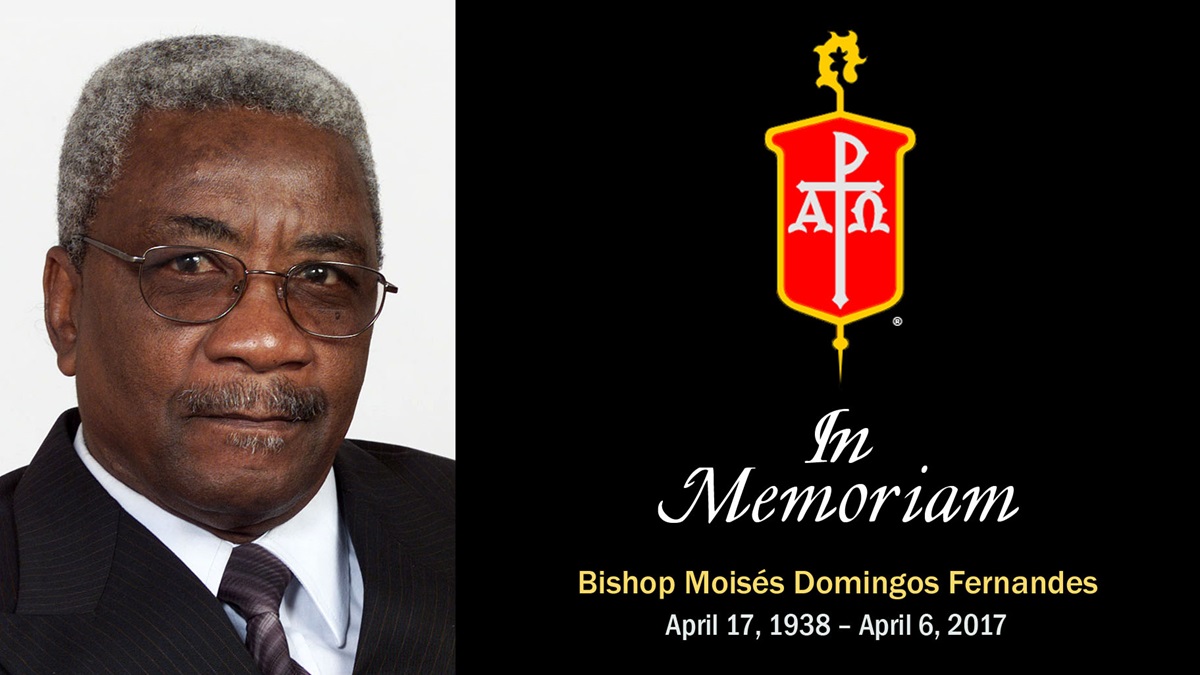Bishop Moisés Domingos Fernandes led United Methodists in East Angola through some of the most brutal days of the country’s civil war and braved an attempt on his life.
Throughout these ordeals, he remained committed to his nation’s people and his Christian faith.
The retired bishop died of cancer on April 6 in a hospital in Luanda, Angola’s capital. He was 78. His survivors include his wife of 55 years, Luciana da Silva Clementa Fernandes, and eight children.
“The church was everything for him, as a pastor, a teacher, a mission worker in Angola and a bishop,” said his daughter Lucia Fernandes Slanislas.
Donald Reasoner, who frequently served as the bishop’s interpreter, called Fernandes “a very generous and very humble spirit.”
Reasoner is the director for interpretation services at the United Methodist Board of Global Ministries, the denomination’s mission agency.
He first met Fernandes when the future bishop was a student at the Ecumenical Seminary in Cuba.
“He was not one to be lording over things,” Reasoner said. “He was a gentle soul.”
Underlying that gentleness was steely courage and faith, Reasoner attested.
Fernandes, born April 17, 1938, grew up in a Methodist family in Malange, a city in the middle of the country.
He was elected bishop in 1988. He became the first to lead East Angola after United Methodists split the Angola Conference in two.
Angola had suffered civil violence off and on since the country achieved independence from Portugal in 1975. However, fighting intensified in the 1990s.
Most of the fighting raged in Fernandes’ area. Although it covered more than half the country, the area saw a mass exodus as people fled west for refuge from the violence. Warring factions installed deadly mines across the area.
Among the places destroyed was the United Methodist Quessua Mission, where Fernandes had served earlier in his ministry.
At one point, rebels entered the episcopal residence trying to hunt the bishop down, Reasoner said.
Fernandes was able to escape by jumping out a second-floor window, but he broke both his legs. He spent more than a year of recovery in Portugal, but willingly returned to resume his duties as a bishop in Angola.
When he returned, Fernandes went about the task of organizing the new conference, said retired Bishop Emilio J. M. de Carvalho, who served in West Angola while Fernandes was in the east.
"In spite of his physical limitations, he took Methodism to the eastern borders of our country, opening new congregations and establishing United Methodism in those areas," DeCarvalho said.
The country finally achieved a lasting peace in 2002, after Fernandes retired. United Methodists and other Angolans have worked to rebuild the country, including Quessua. Nonetheless, the recovery continues.
Retired Bishop Warner Brown Jr., former Council of Bishops president, visited the episcopal offices in Malange after Fernandes retired and could still see the scars of war.
“The building across the street had been shelled and was empty,” Brown recalled. “There were shell impacts in the streets around.”
Yet, Fernandes remained in his office and home through most of the violence and led the church as best he could, Brown said. The well at the church office was the area’s only source of water after the war.
“It was an extremely difficult time, but he was a servant leader. He stayed in the country as long as he could and did not try to lead from outside of the country,” Brown said. “He stayed with his people as best he could.”
De Carvalho added: "In the line of the sacrífice that bishops from Africa have to go through to fulfill their duties, one can say that Bishop Fernandes was a faithful man of God and a lead servant to his brothers and sisters in Angola."
Hahn is a multimedia news reporter for United Methodist News Service. Contact her at (615) 742-5470 or newsdesk@umcom.org. To read more United Methodist news, subscribe to the free Daily or Weekly Digests
Like what you're reading? Support the ministry of UM News! Your support ensures the latest denominational news, dynamic stories and informative articles will continue to connect our global community. Make a tax-deductible donation at ResourceUMC.org/GiveUMCom.




